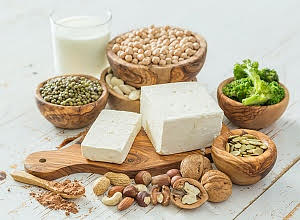A small Finnish study found that vegan children to have significantly altered metabolism and lower vitamin A and D status compared to children with no special diet, reports MedicalBrief.
A pilot study at the University of Helsinki on the metabolic effects of full vegan diet on young children. concludes that vegan diet has a broad effect on children's metabolism. Serum biomarker levels for vitamins A and D, cholesterol forms and essential amino acids were significantly lower in children on vegan diet compared to age-adjusted omnivores. In addition, docosahexaenoic acid is absent from vegan diet.
Vegan diets gain popularity especially among young adults, and through choices of the families vegan diet is becoming more common in young children, too. The motives behind choosing a vegan lifestyle are ecological, ethical and health-related: vegan diets exclude all animal-based products. It is recommended that full vegan diet is always supplemented with vitamin B12, vitamin D and iodine, and based on individual assessment the supplementation for calcium, vitamin B2, iron and zinc may be needed.
Except for vitamin D, the study did not find differences between diet groups in the levels of these nutrients in young children. All of the participated vegan children used regular vitamin B12, and all but one used regular vitamin D and iodine supplementation, indicating that Finnish vegan families are well familiar with the previously known nutritional requirements of vegan diets. However, current nutritional recommendations are based on studies conducted on adult vegans, and previous studies on metabolic effects of vegan diets in children do not exist.
In their recently published article Dr Topi Hovinen, and Dr Liisa Korkalo, together with the multidisciplinary team led by academy professor Anu Suomalainen-Wartiovaara and docent Maijaliisa Erkkola studied comprehensively the nutrition and metabolism of 40 healthy children in day-cares of Helsinki.
The children were following a vegan, vegetarian or omnivore diet according to the choice of their families. Their nutritional intake, metabolic biomarkers and micronutrient statuses were extensively studied.
The children on a fully vegan diet were found to have significantly lower vitamin D levels compared to children without a special diet despite having regular vitamin D supplementation and blood samples being collected in late summer. Surprisingly, also their vitamin A status was lowered. Levels for LDL and HDL cholesterol, essential amino acid and docosahexaenoic acid, a fatty acid with a central role in development of visual function, were low while folate levels were remarkably high in vegan children.
According to the researchers, the new findings motivate further and larger studies on the health consequences of a vegan diet in young children. "Our results indicate that the health effects of strict diets on children cannot be extrapolated from studies on adults. In addition to vitamin D intake, attention must be paid to adequate intake of vitamin A and protein from various sources." says Hovinen.
Study details
Vegan diet in young children remodels metabolism and challenges the statuses of essential nutrients
Topi Hovinen, Liisa Korkalo, Riitta Freese, Essi Skaffari, Pirjo Isohanni, Mikko Niemi, Jaakko Nevalainen, Helena Gylling, Nicola Zamboni, Maijaliisa Erkkola, Anu Suomalainen
Published in EMBO Molecular Medicine on 20 January 2021
Abstract
Vegan diets are gaining popularity, also in families with young children. However, the effects of strict plant‐based diets on metabolism and micronutrient status of children are unknown. We recruited 40 Finnish children with a median age 3.5 years—vegans, vegetarians, or omnivores from same daycare centers—for a cross‐sectional study. They enjoyed nutritionist‐planned vegan or omnivore meals in daycare, and the full diets were analyzed with questionnaires and food records. Detailed analysis of serum metabolomics and biomarkers indicated vitamin A insufficiency and border‐line sufficient vitamin D in all vegan participants. Their serum total, HDL and LDL cholesterol, essential amino acid, and docosahexaenoic n‐3 fatty acid (DHA) levels were markedly low and primary bile acid biosynthesis, and phospholipid balance was distinct from omnivores. Possible combination of low vitamin A and DHA status raise concern for their visual health. Our evidence indicates that (i) vitamin A and D status of vegan children requires special attention; (ii) dietary recommendations for children cannot be extrapolated from adult vegan studies; and (iii) longitudinal studies on infant‐onset vegan diets are warranted.
[link url="https://www.embopress.org/doi/full/10.15252/emmm.202013492"]EMBO Molecular Medicine study (Open access)[/link]
From MedicalBrief archives:
[link url="https://www.medicalbrief.co.za/archives/vegetarians-and-vegans-lower-heart-disease-risk-higher-risk-of-stroke/"]Vegetarians and vegans: Lower heart disease risk, higher risk of stroke[/link]
[link url="https://www.medicalbrief.co.za/archives/parents-vegan-children-italy-may-face-jail/"]Parents of vegan children in Italy may face jail[/link]

